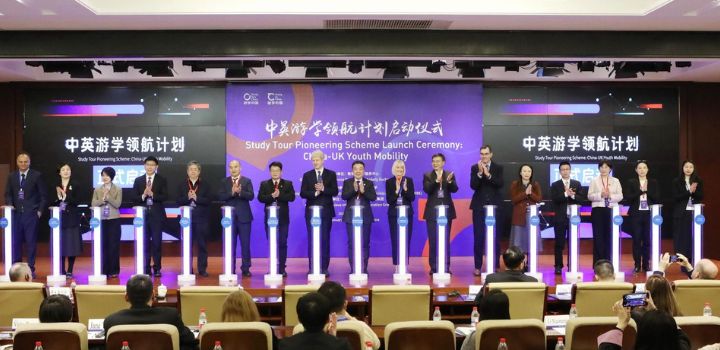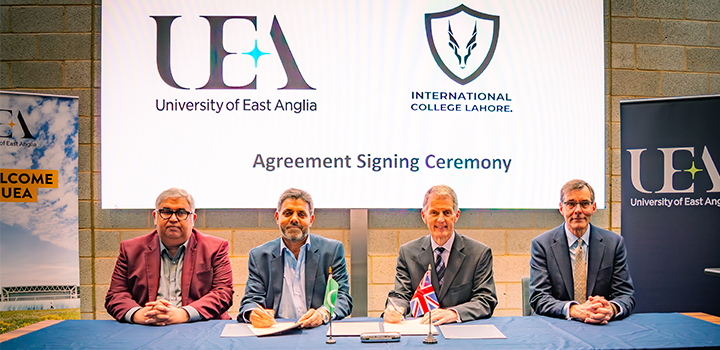UEA’s Big Sister Little Sister programme aims to address gender disparity in Computing Sciences
By: Communications

In 2024, BCS (The Chartered Institute for IT) used UCAS data to report that around 2,940 UK-domiciled 18-year-old women had accepted a place to study Computing Sciences, out of a total of 15,530 18-year-old UK-domiciled acceptances.
While the male to female ratio is closing slowly, with an 8% increase noted from 2023/24, the difference remains wide, for a variety of reasons.
At the University of East Anglia (UEA), which currently has around 10-12% female and non-binary students within Computing Sciences, steps have been taken to address both the gender disparity, through targeted outreach activity in schools, and the fostering of a supportive environment on-campus through mentoring and dedicated events – thanks to the Big Sister Little Sister (BSLS) programme.
BSLS was initially set up in 2017 by Debbie Taylor, a Lecturer in Computing Sciences at UEA, with the aim of improving and promoting gender equality in a male-dominated environment.
Debbie, who struggled at school (especially with maths, due to undiagnosed dyslexia, dyspraxia, and dyscalculia), didn’t go to university straight away, opting instead to go straight into the IT and computing industry. During her 25 years working in this industry, she also set up her own consultancy business.
After experiencing a self-confessed ‘midlife crisis’, Debbie decided to go to university, saying:
“Friends got tired of hearing me say ‘I’d love to study this properly’. They encouraged me – strong-armed me, really – by saying: ‘You’re in a position where you don’t need to worry so much about money. Your career’s steady, but you’re bored. So do it’.
“I never thought I’d get into UEA, but I did. I started with the foundation year, and at the time, there were only two women in that cohort. When I moved into year one, that number grew to maybe 10 or 15, but it was still very low.”
Noting the gender-disparity in Computing Sciences, Debbie decided tobegin to address it and support those already enrolled, saying:
“Over the next few years, I noticed that many of the female students came to me with questions they didn’t feel comfortable asking male lecturers or classmates. I’ve always been quite open – I’ll talk to anyone – and I think being older helped too.
“So, in 2017, I launched Big Sister Little Sister. It started small, just 10 to 15 students, many of whom were my friends. But it’s grown steadily over time. Now, the students are taking the lead.”
The programme includes everyone from foundation year students to master's students, postgraduate students, and alumni.
Getting support in place early for students is key, as Debbie notes:
“Our first event is usually in week one or two – a pizza night – and it’s amazing to watch how much they grow over the year. They get to know other women and non-binary students in computing, and they build friendships and networks. You see them begin to believe they actually belong here.”
Noting what she sees as a recurring problem for women and non-binary students entering computing, Debbie said:
“Confidence is a big one, and imposter syndrome plays a huge role. It’s something I’ve struggled with too. Many of the women and non-binary students coming into computing have had to fight to be taken seriously, especially in school, where they’re often told – implicitly or directly – that computing is more suited to boys. That messaging sticks.”
BSLS is now run, with support from Debbie and other academics, by a group of students including Sophie Bennett, Venus Nasseri, Nithya Vinaitheerthan, and Joy-Moriah Balenthiran.
Nithya, a second-year Computer Systems Engineering with a Year in Industry student originally from Hertfordshire, who was a part of the programme before becoming a mentor, speaks about why she wanted to become more involved, saying:
“I wanted leadership experience and a chance to give back. I remember how lost I felt at the start – there are so many paths in computing science, and a lot of it is self-taught. Helping others through that and exchanging ideas is very rewarding,
“Interacting with like-minded women and non-binary students, it challenges my perspectives and helps me grow. Also, when someone says they feel more welcome or learned something meaningful, it makes it all worth it.”
Joy, a second-year Computing Sciences with a Year in Industry student from Berkshire, talks about the most rewarding part of being involved with BSLS, saying:
“For me, it was about supporting women in tech. In the first year, the gender imbalance was stark, and it could feel isolating. I wanted to help make tech feel more accessible and inclusive. Plus, I enjoy mentoring and building community.”
One of the stand-out successes from the programme, and one that is having a positive impact in the region, is the iBelong sessions that run in the summer for local schools. Funded by UEA, these are staffed entirely by female faculty and students.
In 2024, iBelong hosted around 100 female and non-binary students, with a Q&A panel featuring faculty and members of Big Sister Little Sister. Due to such high demand, this year’s sessions are being expanded to two days, to accommodate the expected 200 attendees.
When asked if she would like to address any particular myths around Computing Science, Debbie said:
“Probably my biggest one is that computing is a ‘man’s subject’. It’s not. Computing is for everyone. It’s about problem-solving, creativity, and thinking outside the box. Your gender, race, or background has nothing to do with your ability to succeed in this field.”
Related Articles

UEA strengthens academic relations through new study scheme
The University of East Anglia has joined a major new initiative designed to boost cultural and academic exchange between students in China and the UK.
Read more
Indian and UK institutions unite to strengthen cybersecurity education in India
A UK-India partnership aiming to train 100 faculty members on advanced cybersecurity topics, will focus particularly on female staff in tier-2 cities to become catalysts for change in their institutions and communities.
Read more
University of East Anglia announces strategic partnership with International College Lahore
The University of East Anglia (UEA) is proud to announce a new international partnership with International College Lahore (ICL), a pioneering higher education institution being established in Pakistan.
Read more